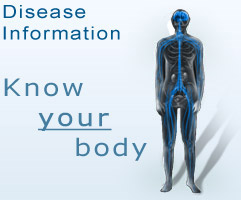Metabolic Syndrome
What is metabolic syndrome?
Metabolic syndrome, sometimes called syndrome X, refers to a group of risk factors for heart disease. You may have metabolic syndrome if you are overweight, have high blood pressure and high levels of sugar or fats in your blood. Many patients with diabetes that are treated with medication and/or are on a healthy, balanced eating plan (adult-onset diabetes) also have metabolic syndrome.
Metabolic syndrome measurements and results
You may be vulnerable to metabolic syndrome if you have three or more of the following:
- increased waist circumference of 102 cm or more in men and 88 cm or more in women (90 cm or more in Asian men and 80 cm or more in Asian women), indicating central obesity (the body's fat concentration is on the abdomen and upper body)
- blood pressure higher than 130/85 mm Hg or active treatment for hypertension
- fasting plasma glucose level higher than 5.6 mmol/l or active treatment for hyperglycaemia
- elevated triglycerides (high cholesterol levels of 1.7 mmol/l or more)low levels (i.e. less than 1.0 mmol/l in men and less than 1.3 mmol/l in women) of high-density lipoprotein (HDL), which transports cholesterol to the liver. High HDL levels decreases the risk of heart disease.
What is the significance of metabolic syndrome?
Metabolic syndrome happens when you don't get enough exercise and you consume a diet high in calories and saturated fat. You can lower your risk of heart disease and diabetes by exercising, changing some eating habits, quitting smoking, and losing weight.
For each additional risk factor you have, your risk for heart disease increases. If you have all of the risk factors, you are six times as likely to get heart disease. Even if your cholesterol level is normal, you still may be at risk for a heart attack or stroke.
How can exercise help reduce the symptoms of metabolic syndrome?
How much exercise and what kind of exercise you should do depend on your fitness level. Not being active is the biggest risk factor for heart disease. If you don't already exercise, start by walking for five minutes every day. It may be difficult at first, so go slowly. If you have any medical problems, consult your doctor before you start walking.
Once you are walking regularly, you should slowly increase the pace and length of your walk. Eventually you should walk for 30 to 60 minutes at least five days a week. If you already exercise this much, consider adding resistance exercises to build muscle strength.
How do I start exercising?
Many people find it hard to start an exercise programme. Find a friend with whom to exercise and get in shape together. There are a lot of books, videos, and programmes to help. Remember that a good exercise programme includes three parts: warm-up and stretching, cardiovascular exercise (such as walking and biking), and strength training.
Can my diet reduce the risk of metabolic syndrome?
Yes; what you eat can affect how you feel. To lower your risk, try to make the following changes to your daily diet:
Eat fewer calories
- Try to eat less at each meal, and skip dessert. Snack on low-calorie foods such as carrots or rice cakes. Try not to eat fried foods. When eating out, ask that gravy, sauces, or salad dressings be served on the side, and use only a little of them. Cut down on the amount of fat added to your starches (for example, don't put butter on a baked potato or a slice of bread). Remove the skin from chicken before eating.
Eat less saturated fat
- Change from full-fat dairy products (such as whole milk, cheese, yoghurt and cottage cheese) to reduced-fat and then low-fat (or skim) versions. Use only small amounts of butter or use a margarine that has no trans-fatty acids (such as tub or squeeze packages of margarine). Eat smaller portions of red meat and preferably beef and not mutton. Buy leaner cuts of meat. Eat chicken breasts instead of dark meat. Have at least one meatless dinner per week (however do not use eggs or cheese instead of meat in this meal).
Eat more whole grains
- Eat whole wheat bread, brown rice, oatmeal and puffed-grain cereals.
Eat more fruit and vegetables
- We should all eat at least five servings of fruit and vegetables each day. Eat fruit for snacks instead of chips, sweets or candy-bars. Count how many fruit and vegetable servings you eat each day. Look for ways to get your 'five-a-day' (two servings of fruit and three servings of vegetables).
Eat fish
- Fish contains omega-3 fatty acids, which are good for your heart. Adding fish to your diet is healthier than red meat or cheese. Tuna, salmon, white fish and mackerel are good choices. Baking, broiling, or poaching fish will help you avoid extra calories from breading and frying.
Use healthier fats
- Olive, canola and sesame oil are healthier than corn or vegetable oil. Use only small amounts of lard, pork fat, or vegetable oil for cooking. Try using the healthier oils in your recipes.
These minor lifestyle adjustments will bring you great health benefits.
References
AMERICAN FAMILY PHYSICIAN. 15 July 2004.
 TransmedBanner4.jpg)

